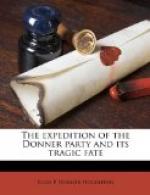They came to our house, and we had a hurried little talk with a closed window between us, and were favorably impressed by our tall “Brother Ben,” who had very blue eyes and soft brown hair. He was the second of the three Wilder brothers, who had been among the early gold-seekers, and tried roughing it in the mines. Though a native of Rhode Island, and of Puritan ancestry, he was quite Western in appearance.
Though not a wealthy man, he had a competency, for he and his elder brother were owners of an undivided half of Ranchos de los Cazadores (three leagues of land in Sacramento Valley), which was well stocked with horned cattle and good horses. He was also interested in a stage line running between Sacramento and the gold regions. He encouraged Elitha in her wish to make us members of their household, and the home they had to offer us was convenient to public schools; yet for obvious reasons they were now silent on the subject.
CHAPTER XXX
IDEALS AND LONGINGS—THE FUTURE—CHRISTMAS.
At the time of which I now speak, I was in my eleventh year, but older in feeling and thought. I had ideals and wanted to live up to them, and my way was blocked by difficulties. Often, in the cowyard, I would say to the dumb creatures before me,
“I shall milk you dry, and be kind to you as long as I stay; but I shall not always be here doing this kind of work.”
These feelings had been growing since the beginning of grandpa’s partnership in that bar-room. Neither he nor grandma saw harm in the business. They regarded it as a convenient place where men could meet and spend a social evening, and where strangers might feel at home. Yet, who could say that harm did not emanate from that bar? I could not but wish that grandpa had no interest in it. I did not want to blame him, for he was kind by nature, and had been more than benefactor to Georgia and me.
Fond recollection was ever bringing to mind joys he had woven into our early childhood. Especially tender and precious thoughts were associated with that night long ago when he hurried home to inspect a daguerreotype that had just been taken. Grandma handed it to him with the complaisant remark, “Mine and Georgia’s sind fine; but Eliza’s shows that she forgot herself and ist watching how the thing ist being made.”
Grandpa looked at it in silence, observing that grandma’s likeness was natural, and Georgia’s perfect, in fact, pretty as could be; while I, not being tall enough to rest my elbow comfortably upon grandma’s shoulder, stood awkwardly with my flowers drooping and eyes turned, intently watching in the direction of the operator. Regretfully, I explained:
“Grandpa, mine was best two times, for Georgia moved in the first one, and grandma in the next, and the pictureman said after each, ’We must try again.’ And he would have tried yet again, for me, but the sun was low, and grandma said she was sorry but this would have to do.”




